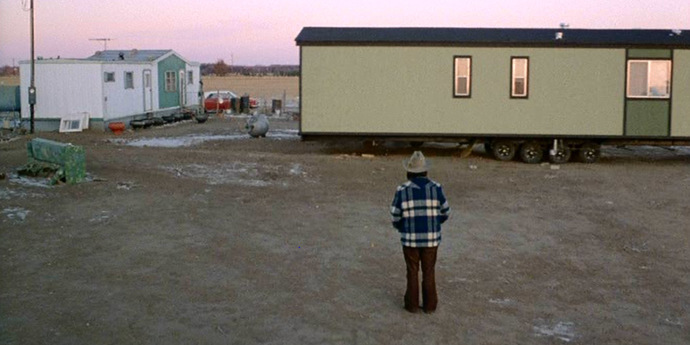
Stroszek (1977) is one of Werner Herzog’s greatest films. It’s a darkly comic character study and indictment of American culture. If the American dream is an open road of limitless potential and rock n’ roll in the early films of Wim Wenders, then for Herzog it’s a pick-up truck going in circles, burning away from the inside as chickens dance on hot plates. The rural Wisconsin plains joins the Amazon jungle and the Sahel desert as dreamscapes that contain the cartoonishly sadistic world of Werner Herzog’s cinema.
Stroszek‘s titular character is a simple street musician (played by Herzog’s singular muse Bruno Schleinstein) who falls in love with the prostitute Eva (Eva Mattes). After some humiliating run-ins with Eva’s pimp Stroszek takes her with him when he joins his neighbor Scheitz (Clemens Scheitz) on the journey to Wisconsin to live in a prefab trailer home.
Stroszek casts the United States through German eyes. The disenfranchised of Germany come to the land of opportunity to be systematically disillusioned by swindlers. Herzog merely reimagines people he knows and throws them into a context that could only be described as the filmmaker’s most personal manifesto. The insular cultures of the rural setting are fetishized as documentary “truths” thrust into a fiction where they become otherworldly fantasies.
Stroszek isn’t a fantasy of history nor is it an uncanny allegory, it’s Herzog taking his documentary practices and applying them to a fiction that took him four days to concoct. Stroszek is a film shot cheaply and quickly concerned with the unreal of our savage reality. Bruno Schleinstein is Kaspar Hauser again but without the superficial distance afforded by a period piece. Now, as Stroszek, Schleinstein must navigate West Germany and the U.S.A. of the 1970s as a stand-in for Herzog himself. The tragedy at the heart of Stroszek is that the titular character naively follows the American dream to its inevitable conclusion and self-destructs.
It is Herzog’s deep affection for Schleinstein that makes Stroszek at all bearable. The antipathy Herzog felt, and probably feels to this day, toward our modern society is the ostensible thesis of a film built out of Herzog’s own singular preoccupations and quirks. Stroszek is Herzog’s personal film, his In A Year With 13 Moons (1978), and he makes no apologies for it.
The discourse between American popular culture and post-war German culture that informed the bulk of the films made during the New German Cinema movement is finally addressed directly by Herzog in Stroszek. Aguirre, der Zorn Gottes (1972), Herz aus Glas (1976), and Auch Zwerge haben klein angefangen (1970) have their roots firmly set in the Weimar era of German cinema, building upon the legacies of F.W. Murnau, Fritz Lang, and G.W. Pabst to create a wholly German cinematic experience for the seventies as if Nazism had never touched the movie house. Stroszek, on the other hand, acknowledges Nazism’s legacy in the form of the title character’s disenfranchisement; it looks at American culture as a macabre grotesque that itself is akin to the fallout after WWII in Germany; it even finally accepts that souls like Schleinstein are invariably exploited and disposed of by these modern cultures.
